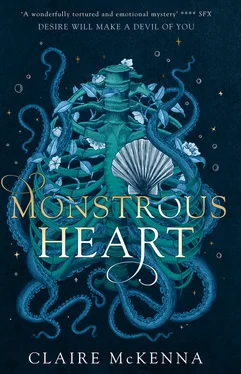It was only when the Coastmaster Contents Cover Title Page Copyright Dedication Book One: Vigil 1: It was only when the Coastmaster 2: A whore clothed herself 3: Oh dear 4: As was the custom 5: Her uncle had left her a boat 6: The tides had a certain 7: The Vernon Justinian who went to Garfish Point 8: Mr Quill was dreadfully curious 9: When she’d first met 10: Mr Harrow 11: Mr Quill’s car 12: She swam with the surge 13: Something in the quality of her life 14: Wake up! 15: A delicate pattern of daylight fell Book Two: The Lion 16: The invitation came 17: The night took on a different feeling 18: Half an hour I waited in this freezing cold 19: Vigil in the morning 20: Arden had expected that she would break 21: I just wish you didn’t have to kill them 22: I saw him passing Book Three: Blood 23: Sing to me 24: Do they know 25: No 26: I have come 27: A hull, upside down 28: … and stopped. 29: Was the dumping that woke her 30: So it’s true 31: The Harbourmistress’ boy yelped at her 32: Mr Riven made a sound 33: When he didn’t immediately reply 34: A whump of hot flame 35: Where are they taking us 36: Are you awake 37: Mr Justinian had the last word 38: She could not bear to stay 39: So, to the testmoot Acknowledgements About the Publisher
It was only when the Coastmaster turned to remonstrate the old man struggling to load the Siegfried’s voluminous trunk that Arden Beacon seized the moment and made her escape.
She sidled behind the wheels of the automobile — a thing callously ostentatious in this wild country — and walked off with such a laboured pretence of a casual stroll that it could not be seen as anything but. With each step she feared Coastmaster Justinian’s realization that she was not waiting patiently for him, but had instead slipped his leash.
A sharp turn at a bluestone wall, and then Arden was free.
Out of his sight she felt overcome with relief, and had to lean against the salt-scored stones and gulp chilly air before she felt remotely whole again.
Had it been so long since she wasn’t confined like a criminal under house arrest that she didn’t know quite what to do with herself? This was the first time since she’d arrived in Vigil that Mr Justinian had allowed her out of the Manse, his huge family estate that overlooked the small, coarse coastal town. The instinct to make a sudden getaway had come with such an awful slug of panic she’d almost been inclined not to move at all.
Hadn’t he told her it was dangerous , hadn’t he told her …?
But he’d spent a month telling her these things about Vigil, and her thudding heart and acid stomach were evidence enough of the contempt she held for Mr Justinian, the man who was both the Master of the Coast and her employer. He had made it clear he wanted to be more to her, still. Arden shuddered.
Still, forced to endure his hospitality, Arden had observed Mr Justinian with a calculating eye and taken his measure. She discovered that foremost her host had a predilection towards causing humiliation. It delighted him to be petty, and mean; and so she had grasped the opportunity to be well away from him while his voice still remained fixated on castigating the poor elderly porter.
‘ You fool, you’ll break every dish in that trunk! Put some backbone into it, guy, or I’ll have the Magistrate charge you with the damage …! ’
Mr Justinian would occupied for quite a while longer. Arden straightened her jacket and skirts and looked down a street undergoing some kind of market day. Market day was trading day in this town where even the dread sea-serpent, maris anguis , could find itself pickled in salt and up for sale with the lumpfish. The siren song of trade brought the coastal dwellers out of their hamlets and huts, hauling with them their spoils of the sea. A row of trestle tables fronted anonymous doorways. Each table was topped with the ocean’s produce laid out like a museum of grotesque curiosities. For every recognisable ichthyosaur in a zinc tub filled with ice there bobbed something ghastly and incomprehensible; fish with ten eyes, a barnacle the size of a woman’s torso.
Arden set off, searching for the experience that would make her brief sojourn into freedom worthwhile, and instead found to her sinking disappointment that her host had not lied to her. Vigil was both grim and drab in appearance and utility. An oily yellow mist shrouded the slate roofs and slunk about the chimney pots, giving everything a murky air. The cold air had a burned and salty miasma, despite it having drizzled earlier. Arden startled at the tootling of foghorns as the fishing boats came into the harbour. People wore the odd uniform of the shore: salt-country linens dipped in flaxseed oil and fish-tallow, shirt-collars embellished in bleached thread, plain hogwool jumpers knitted thick and warm.
All this strangeness, but no real sense of blood . No impression of the power that eddied and washed through her own hot northern country like a tide of whispers, that great sympathetic connectedness with the manifestations of life. No Sanguis .
Blood was the great divide that separated the country of Lyonne from the wilder climes of Fiction. The talents that had once been so powerful in this land were now all but forgotten. Once upon a long time ago Arden would have found kin here, talented users of blood like herself.
Arden rubbed her hands, and felt the cut-coins beneath her soft leather fingerless gloves catch and tug from where they’d been newly sewn into her palms. Before the Seamaster’s guildsman had come into her Portmaster’s salty office with bad-news and orders wrapped up in a vellum scroll, she’d kept respectable employment as a lead signaller upon one of the busiest trading harbours in the world. She had been Sanguis Ignis, flame-keeper. Respectable.
But with a single request she had been sent south to this place where no ignis had been born for a hundred years. Nobody would share what she was. She would be at best a novelty come from far away. At worst … well. There was no bottom to that particular pit.
When Arden walked past one market table, a scarred, bearded man touted her in a foreign language. Old Fictish, the dying tongue of the shorefolk of these cold, grey southern oceans. Then he stopped, and stared.
Arden pulled her fine leather coat about her, feeling as much an outsider as she had at any time in her life. If she thought the Fictish people backwards, then they would see her as inexplicably strange, with her sun-embraced complexion, the bright colours of her clothing, and the waxed cotton of her skirt still creamy and un-stained by the oily coal that heated every rude little home here.
‘Roe for sale, madam, sturgeon eggs? Would you like a taste?’ he repeated in a passable Lyonnian.
‘I’m not buying anything today, I’m sorry,’ Arden replied, even though she didn’t even know what he was trying to sell her, for the mess in front of him was as unlikely to be caviar as it was anything edible. He shrugged, unconcerned with her disinterest, as she was not quite his usual customer anyway.
There wasn’t much of a town centre to be had, and soon she found herself back on the waterfront again, where six feather-footed dray horses provided the counterweight to a pulley and a load bound for an overladen cargo boat. Arden stayed to watch at the marvel of such a thing, for in Lyonne’s capital city of Clay Portside a sanguis pondus could make a counterweight weigh whatever it had to, ten tonnes if needed, and no effort was required except a simple pulley. Just as she suspected, no blood here in the country of Fiction, no control over elemental forces, just pure labour.
From the waterfront she had her best view yet of Vigil clawing itself from the sea as a hillocky mess of factories and trade offices fronting a sheltering port. The region played host to fish-processing warehouses, one merchant hotel, and a clumping of lonely, ugly little houses with tiny windows. It had not always been so miserable and backwards, perhaps. At one stage in the recent past there had been an effort to modernize the town, for wires still occasionally strung between lamp posts, evidence of elektrifikation , that startling new technology. Yet on closer inspection the wires hung lax and broken, the lamps in their curlicued galleries browned out, their internal globes grey with a fine ash from where the filaments had charred away.
Читать дальше












